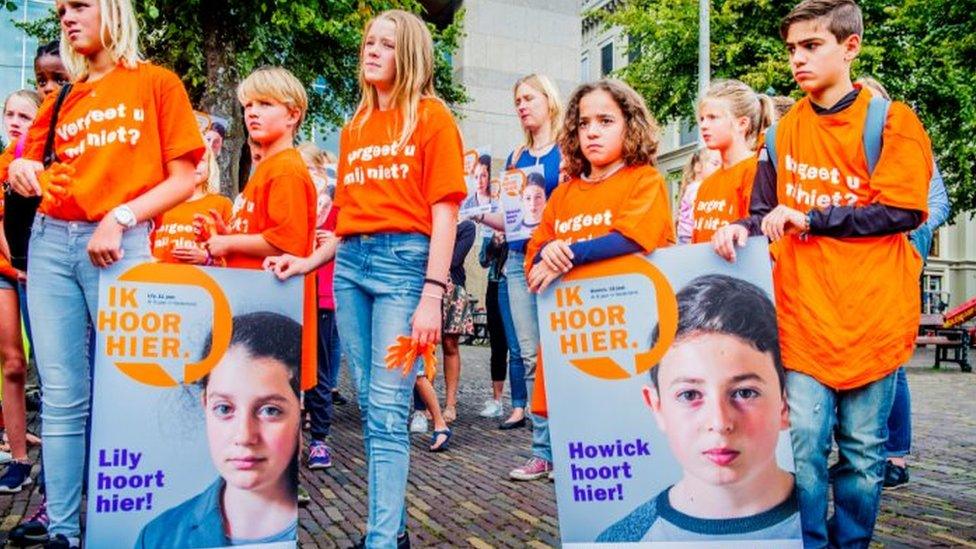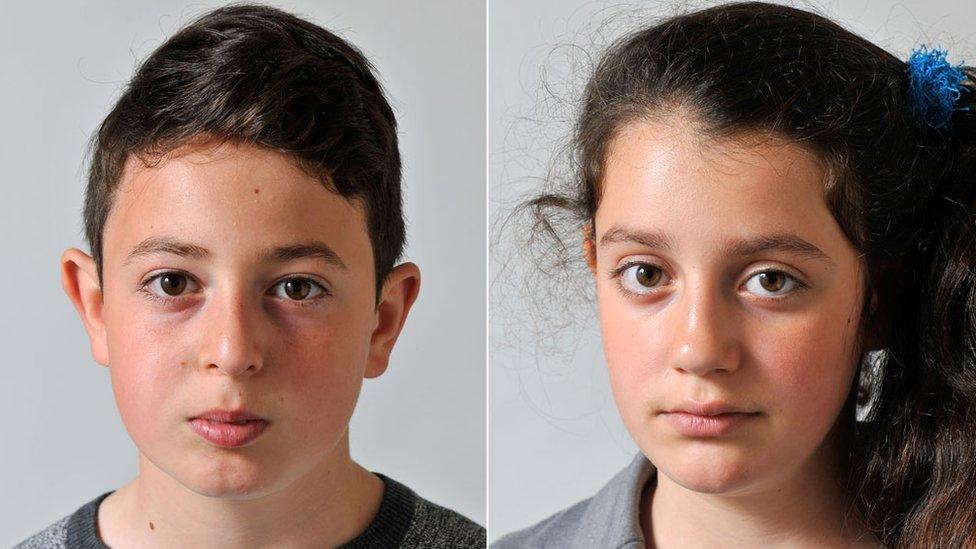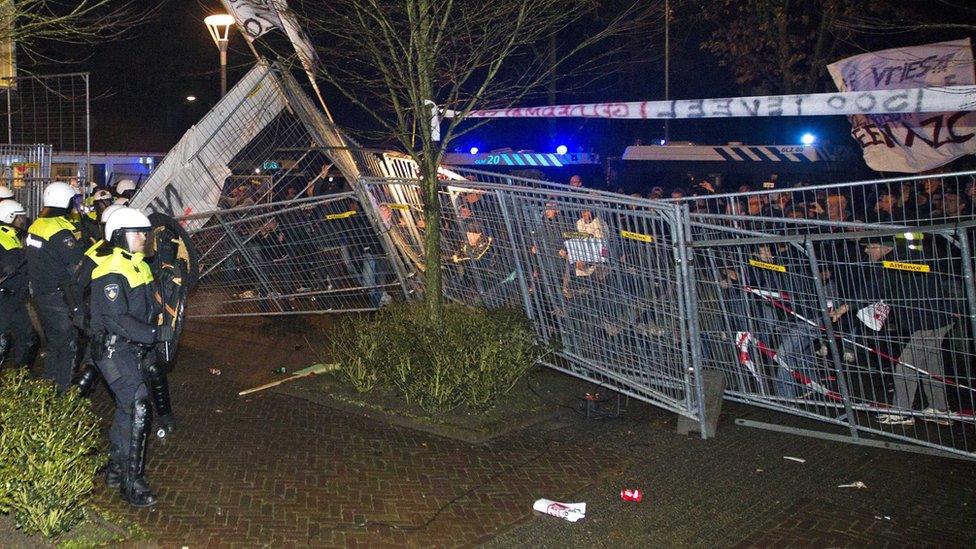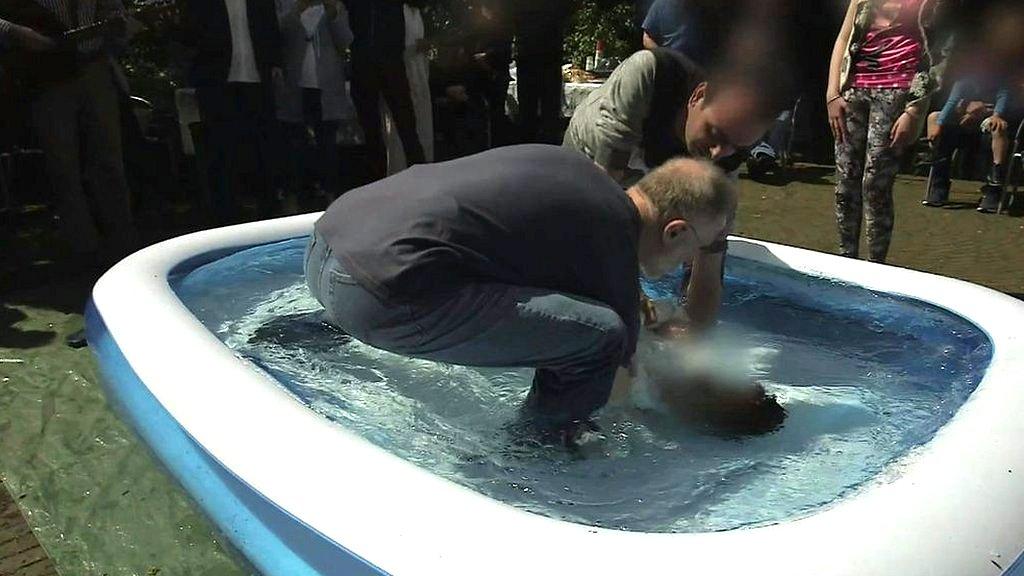Dutch asylum row: Armenian children face expulsion
- Published

The children's school mates have taken part in protests insisting the pair belong in the Netherlands
Two Armenian children who have spent most of their lives in the Netherlands face imminent deportation after emerging from hiding following a failed asylum plea.
Howick, 13, and his sister Lily, 12, came to the Netherlands with their mother in 2008.
Their mother was deported last year and the children's friends have rallied around them, calling for them to stay.
However, the Dutch government insists its asylum policy is fair.
Prime Minister Mark Rutte said last week he understood the emotion surrounding the case but asylum numbers had to be kept under control. "Anyone who doesn't fall under the criteria cannot stay here," he said.
Who are Lily and Howick?
Their mother, 37-year-old Armina Hambartsjumian, applied for asylum shortly after arriving in the Netherlands in 2008 from Russia. The children have never lived in Armenia and barely speak the language.
When their mother was deported in 2017, she sent the children to a secret address before they were found by authorities. They have since been living with a family who had befriended their mother.
For months, the courts considered the children's case, with campaigners arguing their mother was mentally and physically incapable of looking after them and that the children would go to an orphanage.
Protests were held in support of the children by classmates from the city of Amersfoort and the case has become a cause celebre across the Netherlands.

Howick (L) and Lily appeared on Dutch TV on Saturday night saying they belonged in the Netherlands
After a series of asylum rulings, a final decision was made last month that there were no grounds for Lily and Howick to stay. Armenia was a safe country and there was no risk of persecution, the Council of State concluded.
The children would not end up on the street, it decided, and deportation was due to take place on 8 September.
What does the mother say?
In a recent letter to Dutch newspaper Algemeen Dagblad, the children's mother said they were "in hiding" and in a "safe place".
"The stress is so high that I'm scared my children will break down if this goes ahead," she wrote, adding that she had been told by professionals that they were suffering from post traumatic stress disorder.
But on Monday, the newspaper reported that the children had emerged from three days of hiding and reported to authorities.
The Dutch immigration service told the newspaper that it would not go into individual cases.
Appearing on a talk show on Dutch TV on Saturday, the children said they had been really shocked by news of their imminent deportation.
"We belong here. They say you're going back to Armenia but where am I going back to?" said Lily.
"If we do end up there, we'll go into some sort of orphanage meant for a maximum of 20 children, but which already houses 30," Howick added.
Are children's cases different?
Several European countries have struggled with the deportation of children whose asylum cases have been rejected.
Campaign group Defence for Children said they were still hoping that the Dutch migration secretary would overrule the court decision. They say there are 400 cases of children seeking asylum who have lived in the Netherlands for more than five years without a residence permit.
There were protests in the Dutch town of Culemborg last month when a Ukrainian family, whose three children were born in the Netherlands, were deported after living there for 17 years.
The Dutch immigration service turned down just over half of the 16,785 asylum applications made in 2017.
The largest number of rejections was from citizens of Morocco and Algeria.
While tens of thousands of unaccompanied minors entered Germany in 2015 and 2016, almost 90% of asylum claims were successful.
- Published17 December 2015

- Published25 August 2017
